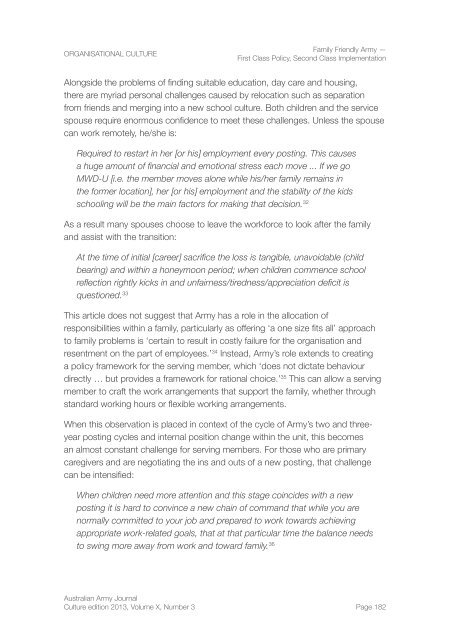Australian Army Journal
Australian Army Journal
Australian Army Journal
You also want an ePaper? Increase the reach of your titles
YUMPU automatically turns print PDFs into web optimized ePapers that Google loves.
Family Friendly <strong>Army</strong> —<br />
ORGANISATIONAL CULTURE<br />
First Class Policy, Second Class Implementation<br />
Alongside the problems of finding suitable education, day care and housing,<br />
there are myriad personal challenges caused by relocation such as separation<br />
from friends and merging into a new school culture. Both children and the service<br />
spouse require enormous confidence to meet these challenges. Unless the spouse<br />
can work remotely, he/she is:<br />
Required to restart in her [or his] employment every posting. This causes<br />
a huge amount of financial and emotional stress each move ... If we go<br />
MWD-U [i.e. the member moves alone while his/her family remains in<br />
the former location], her [or his] employment and the stability of the kids<br />
schooling will be the main factors for making that decision. 32<br />
As a result many spouses choose to leave the workforce to look after the family<br />
and assist with the transition:<br />
At the time of initial [career] sacrifice the loss is tangible, unavoidable (child<br />
bearing) and within a honeymoon period; when children commence school<br />
reflection rightly kicks in and unfairness/tiredness/appreciation deficit is<br />
questioned. 33<br />
This article does not suggest that <strong>Army</strong> has a role in the allocation of<br />
responsibilities within a family, particularly as offering ‘a one size fits all’ approach<br />
to family problems is ‘certain to result in costly failure for the organisation and<br />
resentment on the part of employees.’ 34 Instead, <strong>Army</strong>’s role extends to creating<br />
a policy framework for the serving member, which ‘does not dictate behaviour<br />
directly … but provides a framework for rational choice.’ 35 This can allow a serving<br />
member to craft the work arrangements that support the family, whether through<br />
standard working hours or flexible working arrangements.<br />
When this observation is placed in context of the cycle of <strong>Army</strong>’s two and threeyear<br />
posting cycles and internal position change within the unit, this becomes<br />
an almost constant challenge for serving members. For those who are primary<br />
caregivers and are negotiating the ins and outs of a new posting, that challenge<br />
can be intensified:<br />
When children need more attention and this stage coincides with a new<br />
posting it is hard to convince a new chain of command that while you are<br />
normally committed to your job and prepared to work towards achieving<br />
appropriate work-related goals, that at that particular time the balance needs<br />
to swing more away from work and toward family. 36<br />
<strong>Australian</strong> <strong>Army</strong> <strong>Journal</strong><br />
Culture edition 2013, Volume X, Number 3 Page 182

















